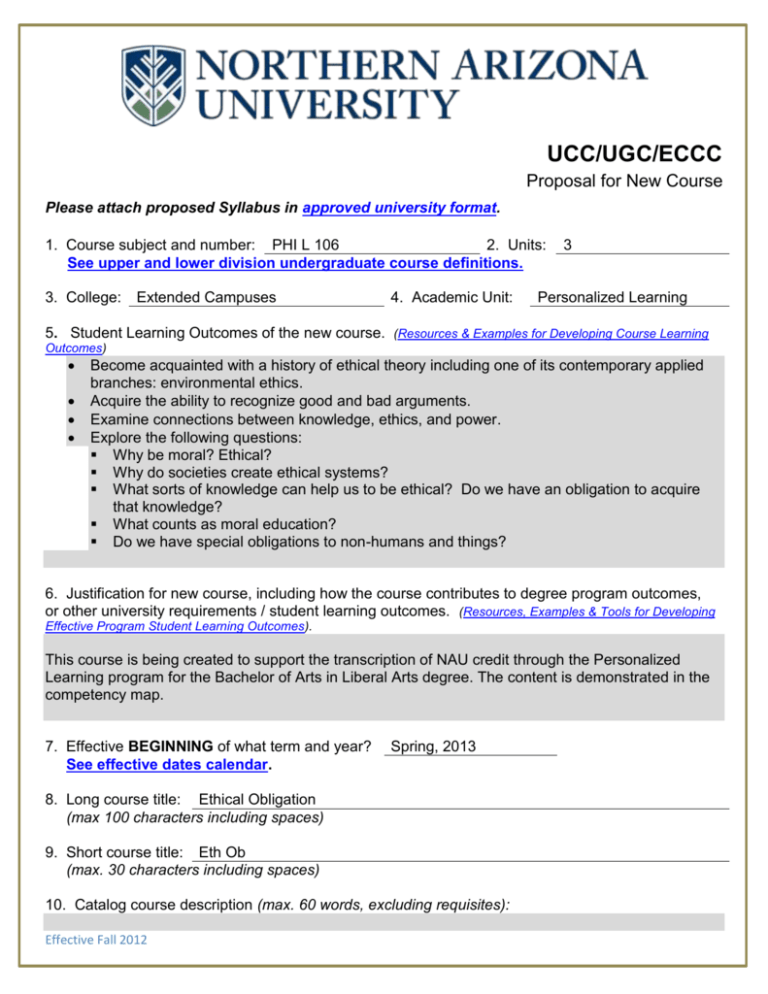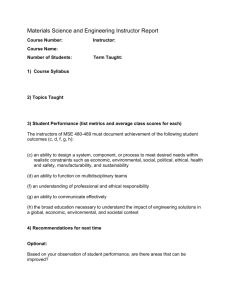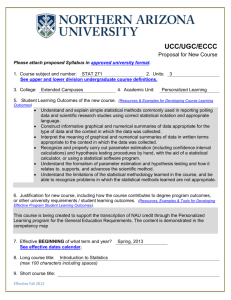PHIL 106
advertisement

UCC/UGC/ECCC Proposal for New Course Please attach proposed Syllabus in approved university format. 1. Course subject and number: PHI L 106 2. Units: See upper and lower division undergraduate course definitions. 3. College: Extended Campuses 4. Academic Unit: 3 Personalized Learning 5. Student Learning Outcomes of the new course. (Resources & Examples for Developing Course Learning Outcomes) Become acquainted with a history of ethical theory including one of its contemporary applied branches: environmental ethics. Acquire the ability to recognize good and bad arguments. Examine connections between knowledge, ethics, and power. Explore the following questions: Why be moral? Ethical? Why do societies create ethical systems? What sorts of knowledge can help us to be ethical? Do we have an obligation to acquire that knowledge? What counts as moral education? Do we have special obligations to non-humans and things? 6. Justification for new course, including how the course contributes to degree program outcomes, or other university requirements / student learning outcomes. (Resources, Examples & Tools for Developing Effective Program Student Learning Outcomes). This course is being created to support the transcription of NAU credit through the Personalized Learning program for the Bachelor of Arts in Liberal Arts degree. The content is demonstrated in the competency map. 7. Effective BEGINNING of what term and year? See effective dates calendar. Spring, 2013 8. Long course title: Ethical Obligation (max 100 characters including spaces) 9. Short course title: Eth Ob (max. 30 characters including spaces) 10. Catalog course description (max. 60 words, excluding requisites): Effective Fall 2012 This course encourages students to explore the nature of ethical obligation. In this course, students will study different philosophers’ views on the nature of ethical obligation, in order to understand their perspectives, as well as to distinguish them from other scholars. 11. Will this course be part of any plan (major, minor or certificate) or sub plan (emphasis)? Yes If yes, include the appropriate plan proposal. No 12. Does this course duplicate content of existing courses? Yes No If yes, list the courses with duplicate material. If the duplication is greater than 20%, explain why NAU should establish this course. This course does not duplicate content of existing course, but is aligned to the learning outcomes from PHI 105. 13. Will this course impact any other academic unit’s enrollment or plan(s)? If yes, include a letter of response from each impacted academic unit. 14. Grading option: Letter grade Yes Pass/Fail No Both 15. Co-convened with: n/a 14a. UGC approval date*: n/a (For example: ESE 450 and ESE 550) See co-convening policy. *Must be approved by UGC before UCC submission, and both course syllabi must be presented. 16. Cross-listed with: n/a (For example: ES 450 and DIS 450) See cross listing policy. Please submit a single cross-listed syllabus that will be used for all cross-listed courses. 17. May course be repeated for additional units? N/A 16a. If yes, maximum units allowed? 16b. If yes, may course be repeated for additional units in the same term? Yes No Yes No 18. Prerequisites: N/A If prerequisites, include the rationale for the prerequisites. Pre-requisite content sequencing and verifications are completed through pre- and post- test and in conjunction with faculty mentors, and are integrated into the curriculum as demonstrated in the competency maps. 19. Co requisites: If co requisites, include the rationale for the co requisites. Effective Fall 2012 20. Does this course include combined lecture and lab components? Yes If yes, include the units specific to each component in the course description above. 21. Names of the current faculty qualified to teach this course: No Cori Gordon Answer 22-23 for UCC/ECCC only: 22. Is this course being proposed for Liberal Studies designation? If yes, include a Liberal Studies proposal and syllabus with this proposal. Yes 23. Is this course being proposed for Diversity designation? If yes, include a Diversity proposal and syllabus with this proposal. Yes Elizabeth Morrison 11.9.12 Reviewed by Curriculum Process Associate Date Approvals: Department Chair/ Unit Head (if appropriate) Date Chair of college curriculum committee Date Dean of college Date For Committee use only: UCC/UGC/ECCC Approval Effective Fall 2012 Date No No Approved as submitted: Yes No Approved as modified: Yes No Effective Fall 2012 SYLLABUS Ethical Obligation (PHIL 106) I. Course Description: This course encourages students to explore the nature of ethical obligation. In this course, students will study different philosophers’ views on the nature of ethical obligation, in order to understand their perspectives, as well as to distinguish them from other scholars. II. Student Learning Outcomes: At the successful completion of the lessons associated with this course, students will be able to: Become acquainted with a history of ethical theory including one of its contemporary applied branches: environmental ethics. Acquire the ability to recognize good and bad arguments. Examine connections between knowledge, ethics, and power. Explore the following questions: Effective Fall 2012 Why be moral? Ethical? Why do societies create ethical systems? What sorts of knowledge can help us to be ethical? Do we have an obligation to acquire that knowledge? What counts as moral education? Do we have special obligations to non-humans and things?







